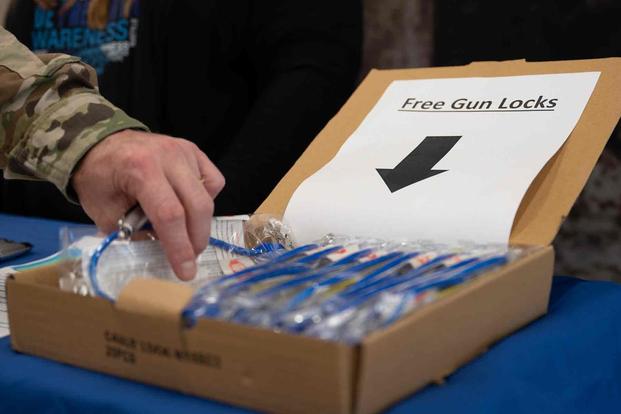Military exchange stores should stop selling guns to troops under 25 years old and require across-the-board waiting periods on firearm and ammunition purchases to reduce high suicide rates, an independent advisory panel to Defense Secretary Lloyd Austin is suggesting.
The firearms restrictions, along with repealing a law passed by Congress in 2013 barring the military from tracking gun purchases, could help reduce the alarmingly high number of troops who continue to kill themselves, the Suicide Prevention and Response Independent Review Committee said in its report released Friday.
Austin created the advisory panel in March 2022, saying the rate of military suicides was too high. The deaths increased 44% between 2015 and 2020 despite a decade of new policies and spending on the problem, and the committee -- focusing on an issue that is a political lightning rod -- said it found guns and access to guns on base play a central role.
Read Next: The Journey Home from Ukraine for Fallen Americans
"When we look at the science of suicide prevention, there's arguably only one thing that all researchers agree on," Dr. Craig Bryan, a lethal means safety expert at Ohio State University who sits on the panel, said during a media roundtable Friday. "And that one thing is that taking steps to slow down convenient access to highly lethal methods like firearms is the single most effective strategy for saving lives."
Restricting gun sales to service members 25 years old or older would filter out younger troops who are most at risk for suicide, and the waiting periods on purchases would slow down access to the means to attempt suicide, which is often an impulsive act, according to Bryan.
On-base stores in the U.S. sold 113,200 firearms in 2021, according to figures provided to Military.com by the exchange services published as part of an investigation into suicides on base. The Army and Air Force have 81 store counters that sell firearms, and the Marine Corps has 11 sites.
Troops, just like most Americans, have a constitutional right to own guns, and many could just go to off-base stores to purchase weapons. Any move to create new restrictions would likely meet fierce opposition from Republican lawmakers on Capitol Hill, who are already attacking the Pentagon as pushing "woke" policies aimed at increased diversity.
With the panel report delivered to the Pentagon chief, any further action will depend on Austin and Congress.
"I would argue that what the recommendations contain are not strategies for gun control, but they are strategies focused on enhancing safety," said Bryan, who is a veteran and was one of the panel experts who worked most closely on firearm recommendations.
The role of firearms in military suicides has long been known as a central problem. Austin was specifically concerned about gun storage when he created the panel, his top spokesman said at the time.
The panel reported Friday that guns are involved in 66% of active-duty suicides, 78% of National Guard suicides and 72% of reserve suicides.
"One of the interesting things that I've run into over the past few years is, I have found military personnel are much more open to this than civilians," Bryan said. "And my sense -- I don't know for sure -- but my sense is that so many of us who have served have lost friends to suicide, and so many of those suicides involve firearms, that we recognize that there is a connection between the two."
Military.com's August investigation detailed deaths that involve troops who buy firearms at base exchanges, take them back to barracks, and then use the weapons in suicide attempts. Family members said commands are not being notified when troops at risk of suicide buy guns at their base stores.
The panel met with 2,776 troops during site visits to three bases in Alaska, where at least 11 service members took their own lives in 2021 and 2022, as well as bases in South Korea, Kentucky, North Carolina, Nevada and California over the past year.
"One of the messages that recurrently came up as we made site visits with military leaders, medical professionals, investigators, law enforcement personnel, was that oftentimes how someone found out that a service member had purchased or acquired a firearm -- often on base at a military exchange -- was only after they had used it to kill themselves," Bryan said.
Under federal law, the military is barred from keeping information on gun owners. Gun advocates in Congress wrote the restrictions into the National Defense Authorization Act a decade ago to protect the Second Amendment rights of troops to bear arms.
"What we found, however, was that unfortunately this provision had the unintended consequence that it actually really handcuffed many military leaders from being able to know who was at elevated risk and to properly assess the safety of their subordinates in personnel," Bryan said.
Military leaders and senior noncommissioned officers repeatedly told the panel that they could not keep track of the most vulnerable and most at-risk service members.
The panel has proposed repealing the law and replacing it with "procedural due process" on collecting and recording information on troops who lawfully purchase firearms.
The panel's report includes a raft of other recommendations to reduce suicides, such as creating a task force to overhaul the military promotion system to "better reward and select the right people for the right positions at the right time based on demonstrated leadership skills and abilities," according to a summary provided to reporters Friday.
-- Travis Tritten can be reached at travis.tritten@military.com. Follow him on Twitter @Travis_Tritten.
Related: These Troops Bought Guns on Base. Then They Used the Firearms to Take Their Own Lives.












